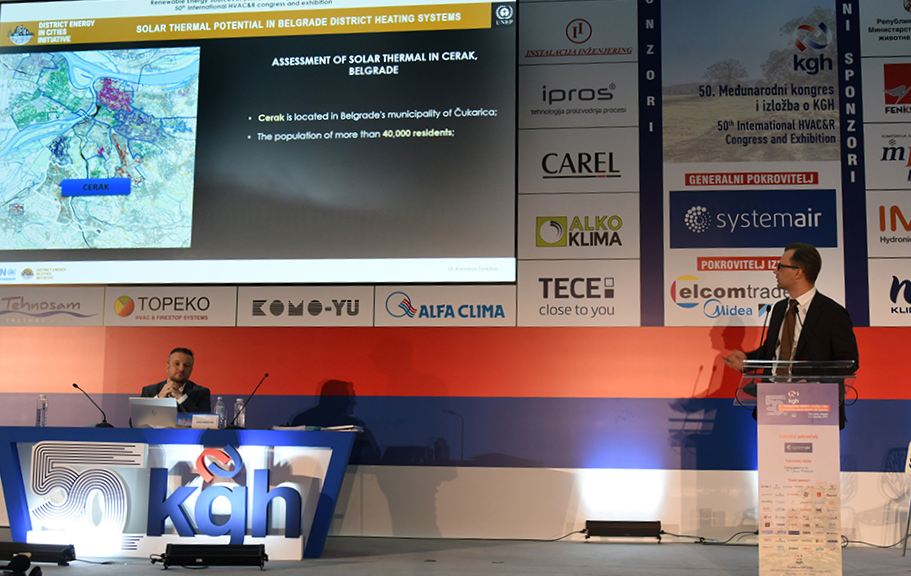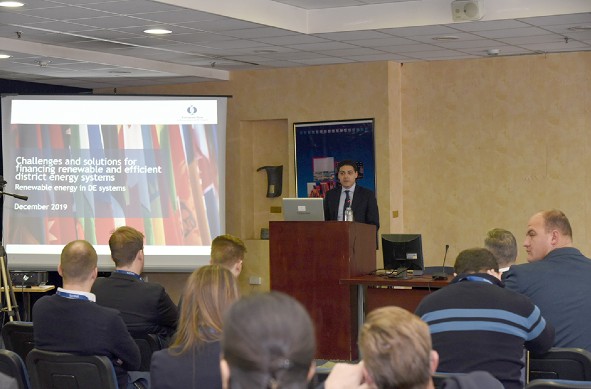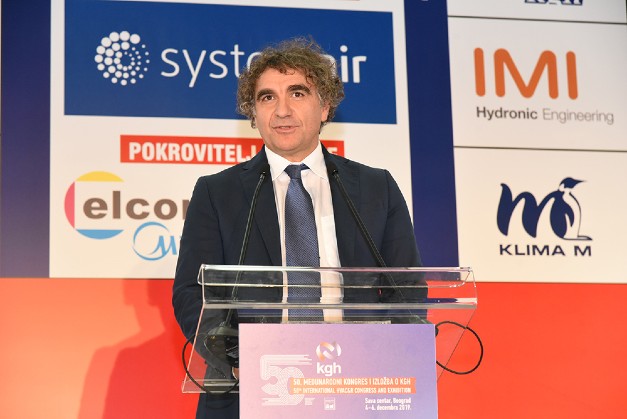
Integration of Low-Temperature Renewable Energy Sources into District Heating and Cooling Systems
.jpg?la=en&hash=400ED69FE57373EA2F7D799C956B728C8A9BDEB4) credits: Balkan Green Energy News portal
credits: Balkan Green Energy News portal In the framework of the project 'Energy Solutions for Cities of the Future', and in collaboration with the European Bank for Reconstruction and Development (EBRD) and the Ministry of Mining and Energy of Serbia, IRENA organised a capacity building event on the integration of low-temperature renewable energy sources into district energy systems targeting in particular Southeast Europe. This activity built on the preliminary results of a guidebook for policy-makers titled “Facilitating the Integration of Low Temperature Renewable Energy Sources in District Heating and Cooling Networks” and was tailored to the specific barriers and needs of the region.
.jpg?la=en&hash=BB40E69A63BAF6814389E7491B0700B0A2C9965B) credits: Milica Knežević for SMEITS©2019
credits: Milica Knežević for SMEITS©2019Under the umbrella of the Global Geothermal Alliance, this capacity building workshop aimed to increase the knowledge of local and national policy-makers and key stakeholders, on options and existing tools to facilitate fuel switch to renewable energy in district energy in cities.
The event focused on four main areas:
- Key success factor for effective strategic heat planning as a first step to integrate renewable energy in new and existing systems;
- Technical challenges and solutions for integrating sustainable low-grade heat sources in existing district heating systems and buildings;
- Enabling framework conditions, financing and business models;
- Technology-specific challenges and solutions for geothermal energy and solar thermal in district heating and perspectives for district cooling.
 credits: Milica Knežević for SMEITS©2019
credits: Milica Knežević for SMEITS©2019
The event was held in Belgrade, Serbia, from 5 December to 6 December 2019, back-to-back with a complementary event led by the EBRD on the Renewable District Energy in the Western Balkans Programme (the ReDEWeB Programme).
The full agenda of the event is available here.
For further information, please contact gga@irena.org.
Presentations
Panel I: Strategic heating and cooling planning
Developing an effective strategic heating/cooling plan: What key success factors? - Nis Bertelsen, Aalborg University
How can geothermal resource assessment and mapping influence decision-making for district heating: Experience from Hungary and the Danube Region - Annamaria Nador, Mining and Geological Survey of Hungary
Panel II: Improving the enabling frameworks for the integration of renewable and excess heat sources in district heating and cooling
Lessons learned and perspectives from the industry - Paul Voss, Euroheat & Power
Technical challenges and solutions for the integration of low-grade heat sources into existing networks and buildings - Jakob Zinck Thellufsen, Aalborg University
Case study from Belgrade, UN Environment:
- City of Belgrade: District Energy Action Plan
- Solar thermal potential in the City of Belgrade’s District Heating System
- Prefeasibility study on interconnection within the District Heating System of the City of Belgrade
Panel IV: Enabling Framework Conditions, Financing and Business Models
Renewable energy market analysis for South-East Europe, Focus on heating and cooling - Emanuele Bianco, IRENA
Ownership structure, financing, and regulation: Experience and innovative approaches - Søren Roth Djørup, Aalborg University
Challenges and solutions for financing renewable energy and efficient district energy systems - Gebrail, Greg, European Bank for Reconstruction and Development.
Perspectives from the private sector - Eirikur Bragason, Arctic Green Energy Europe
Technical challenges and solutions for integrating low-temperature geothermal energy resources: lessons learned from France and the Pannonian Basin - Miklos Antics, GPC IP-Geofluid / European Geothermal Energy Council
Technical challenges and innovative solutions for integrating solar thermal into district heating and cooling - Patrick Reiter, Solid GmbH
IRENA Project Navigator: Technical Concept Guidelines for Renewable heating and cooling systems - Simon Benmarraze, IRENA
Perspectives for district cooling in smart and sustainable energy systems - Jan Eric Thorsen, Oddgeir Gudmundsson, Market Brand, Danfoss


 credits: Milica Knežević for SMEITS©2019
credits: Milica Knežević for SMEITS©2019